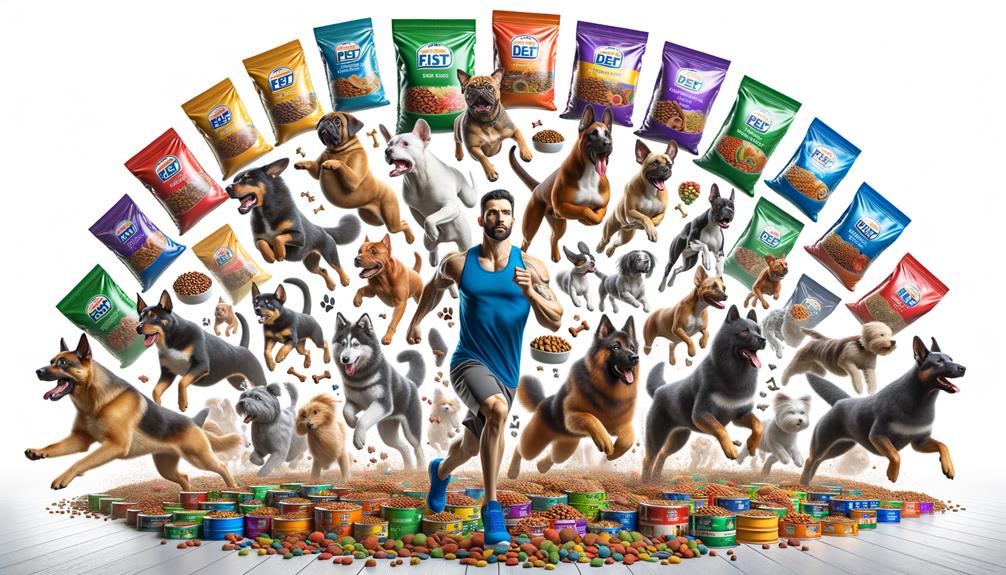You've noticed your dog's ribs are showing a bit more than they should, and you're wondering how you can help them pack on some healthy pounds. Have you considered the role of high-calorie, nutrient-dense dog food in your pet's weight gain? As you weigh your options, remember that the right balance of proteins, fats, and complex carbohydrates is essential to not just weight gain, but also overall health. Let's explore some top-rated, high-calorie dog foods and how they can benefit your furry friend's weight gain journey.
Key Takeaways
- High-calorie dog foods such as Merrick Grain-Free Dry Dog Food and Taste of the Wild Grain-Free High Protein Natural Dry Dog Food aid in weight gain.
- Foods rich in protein, fats, and complex carbohydrates are essential for healthy weight gain in dogs.
- Nutritional supplements can be used alongside regular feeding to boost caloric intake and promote weight gain.
- Special dog foods designed for weight gain include high-protein formulas, nutrient-dense options, and prescription diets.
- Regular vet consultations and monitoring are crucial to ensure that the chosen food is effectively aiding in your dog's weight gain.
Understanding Dog Weight Gain
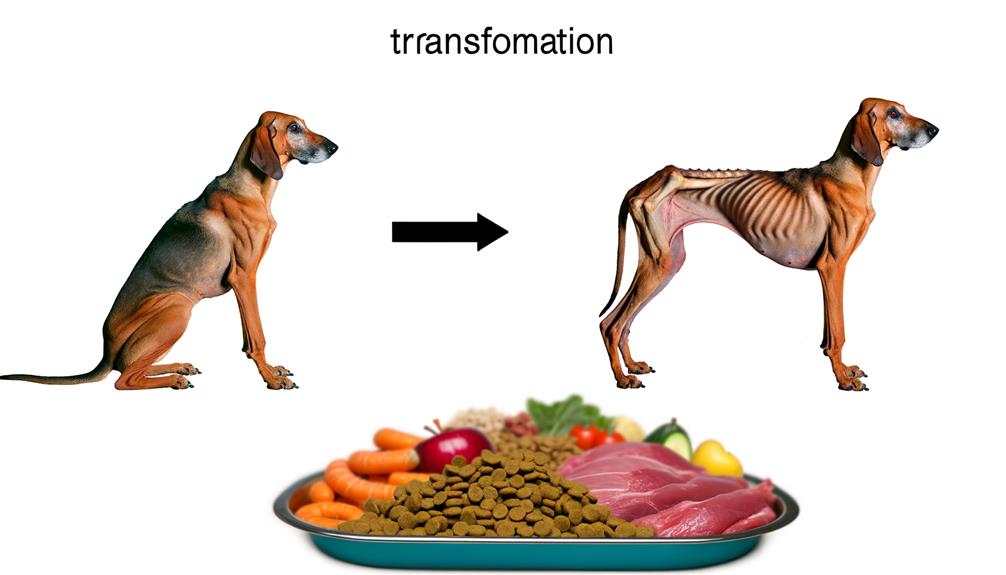
While it might seem counterintuitive, understanding the reasons behind your dog's weight gain is crucial before you start adjusting their diet. You've noticed your pooch packing on a few extra pounds, and your first instinct may be to cut down on their food intake. But hold on, it's not that simple. Dogs, like humans, can gain weight for a variety of reasons – from overeating and lack of exercise to certain health conditions.
It's important to identify the cause before making dietary changes; you don't want to risk exacerbating any underlying health issues. An unexpected weight gain might be an indicator of a more serious condition such as hypothyroidism or Cushing's disease. Let's not forget, canine obesity risks aren't to be taken lightly. They can lead to a plethora of health problems, including diabetes, heart disease, and arthritis. So, make sure you're not turning a blind eye to these potential health risks.
Now, when it comes to weight gain, it's crucial to understand breed specific weight norms. Contrary to popular belief, not all dogs should weigh the same. Smaller breeds naturally weigh less than their larger counterparts. A Chihuahua, for instance, shouldn't weigh the same as a Great Dane. So, before you start fretting about your furry friend's weight, check if it's within the appropriate range for their breed.
In a nutshell, understanding why your dog is gaining weight is the first step to helping them maintain a healthy weight. It's not just about cutting down their food; it's about understanding the cause and making informed decisions. Always consult your vet for personalized advice.
Importance of Protein-Rich Diet
You might wonder why a protein-rich diet is so crucial for your dog's weight gain. Well, understanding protein nutrition can shed light on this.
Let's explore protein-rich foods for dogs and their effect on weight gain.
Understanding Protein Nutrition
In light of your dog's weight gain journey, it's crucial to grasp the importance of a protein-rich diet as it plays a pivotal role in muscle development and weight gain. Protein absorption is essential since it's the process where the nutrients from protein are taken into the body and used. Without proper absorption, your dog may not gain the benefits of a high-protein diet.
It's worth noting that not all proteins are created equal. Some high-protein foods are easier for your dog to digest and absorb than others. And if you're considering vegetarian options for your dog, you need to be extra careful. Plant-based proteins often lack certain essential amino acids that dogs need for healthy growth and weight gain.
Protein-Rich Foods for Dogs
Feeding your furry friend protein-rich foods can significantly bolster their weight gain and overall health. It's not only about meat, either. You can also explore vegetarian protein sources. Foods like quinoa, lentils, and chickpeas are great options, and they're easier on the digestive system.
However, it's important to consider allergies and protein. Some dogs can be allergic to certain types of protein, which can lead to health issues. If you notice any negative reactions, it's best to consult a vet. They can help identify potential allergens and suggest alternative protein sources.
Effect on Weight Gain
Understanding the impact of a protein-rich diet on your dog's weight gain is key, as this nutrient plays a vital role in their body's development and maintenance.
But, you need to be cautious. Overfeeding protein can lead to obesity risks. It's important to strike a balance in your dog's diet, making sure they get enough protein without going overboard.
Recognizing Underweight Dogs
Before you can start helping your dog gain weight, it's crucial that you're able to correctly identify if they're underweight. To do this, you must become familiar with identifying signs of malnutrition. Look at your pet closely. Can you see their ribs, spine, or hip bones prominently? If yes, it's likely that they're underweight. Dogs should have a thin layer of fat over these areas. If you're unsure, it's always best to consult with a vet.
While assessing your dog's weight, it's essential to consider their breed, age, and size. For instance, certain dog breeds naturally have leaner bodies, so what appears underweight for one breed might be healthy for another. You need to have a good understanding of your dog's ideal weight in relation to their breed.
Health risks assessment plays a vital role in this process. Underweight dogs can face numerous health risks including weakened immune systems and increased vulnerability to diseases. They can also suffer from low energy and lethargy. Therefore, it's important to take your dog for regular check-ups so that any weight issues can be identified and addressed promptly.
Feeling your dog's spine and ribs easily, loss of muscle mass, and visible bones are all signs of an underweight dog. But remember, each dog is unique. If you're in doubt, consult with a professional. They can provide you with guidelines to understand what's a healthy weight for your pet. It's all about ensuring your furry friend leads a healthy and happy life.
Feeding for Weight Gain
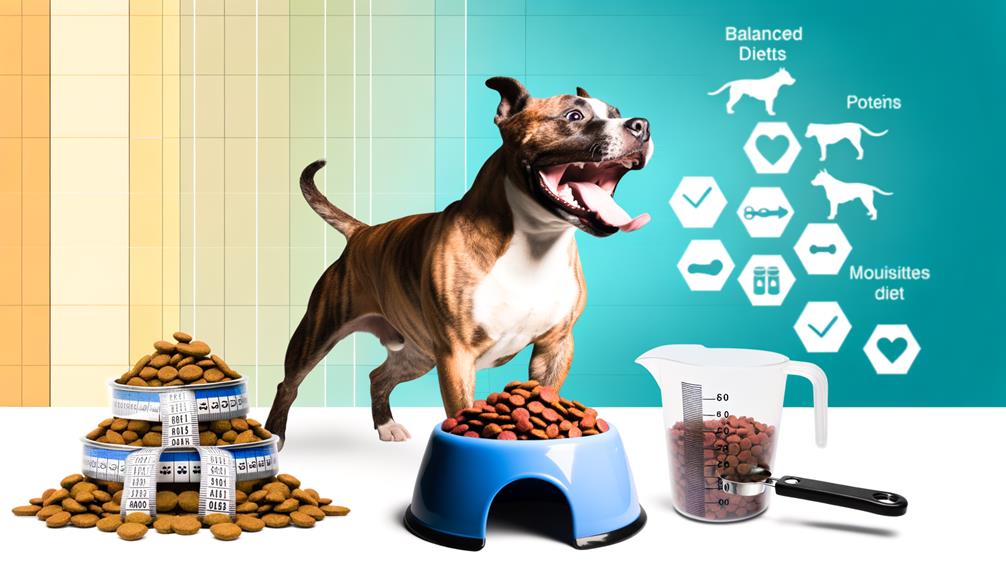
You're now ready to tackle the issue of feeding for weight gain. High-calorie dog foods are a crucial part of the equation, but that's not all there's to it.
The importance of a balanced diet shouldn't be overlooked, and we're about to explore why.
High-Calorie Dog Foods
If your dog needs to pack on a few pounds, high-calorie dog foods can do the trick. These foods have a higher caloric content, which fulfills your dog's caloric requirements for weight gain.
But remember, it's not about feeding your furry friend more; it's about feeding them right. High-calorie foods that are also rich in proteins, fats, and complex carbohydrates will provide the necessary energy for weight gain without compromising on nutritional value or digestive health.
Moreover, these foods are often more easily digestible, ensuring that your dog's stomach isn't overwhelmed. Be mindful of the ingredients, though. Your dog's diet should be high in quality, not just calories. After all, the goal is healthy weight gain.
Balanced Diet Importance
To ensure your dog gains weight healthily, it's crucial to maintain a balanced diet, not just increase calorie intake. A diet overloaded with calories but lacking in essential nutrients won't benefit your pup. It's not only about weight gain but also about overall health.
Remember, dietary allergies can occur, so it's vital to know what your dog can and can't eat. Including a variety of dog-safe foods can help prevent these allergies and offer a broader range of nutrients.
Don't underestimate the importance of hydration. Water aids digestion and nutrient absorption, making it key for weight gain. Always ensure your dog has access to fresh water.
In short, a balanced diet and proper hydration are key when you're trying to help your dog gain weight.
Top High-Calorie Dog Foods
Let's dive into some of the top high-calorie dog foods that can help your furry companion pack on some healthy weight. Remember that the calorie count and feeding frequency are crucial factors to consider when trying to help your dog gain weight.
The first top-rated high-calorie food on our list is the 'Merrick Grain-Free Dry Dog Food.' This recipe is packed with an impressive calorie count of over 430 calories per cup. It's a high-protein, grain-free formula that also contains healthy fats, boosting your dog's energy levels and muscle growth.
Next up is the 'Taste of the Wild Grain-Free High Protein Natural Dry Dog Food.' With a calorie count of approximately 370 calories per cup, this food is filled with digestible proteins and antioxidants for a balanced diet.
Another great option is the 'Purina Pro Plan SPORT Formula Dry Dog Food.' It boasts a high calorie count of 475 calories per cup, designed to fuel your dog's metabolic needs and maintain lean muscle.
Feeding frequency is as important as the calorie count in the food. Small-sized meals fed frequently throughout the day can help your dog metabolize calories more efficiently. This can prevent bloating and other digestive issues, which can be a concern with high-calorie diets.
Review: Blue Buffalo Wilderness
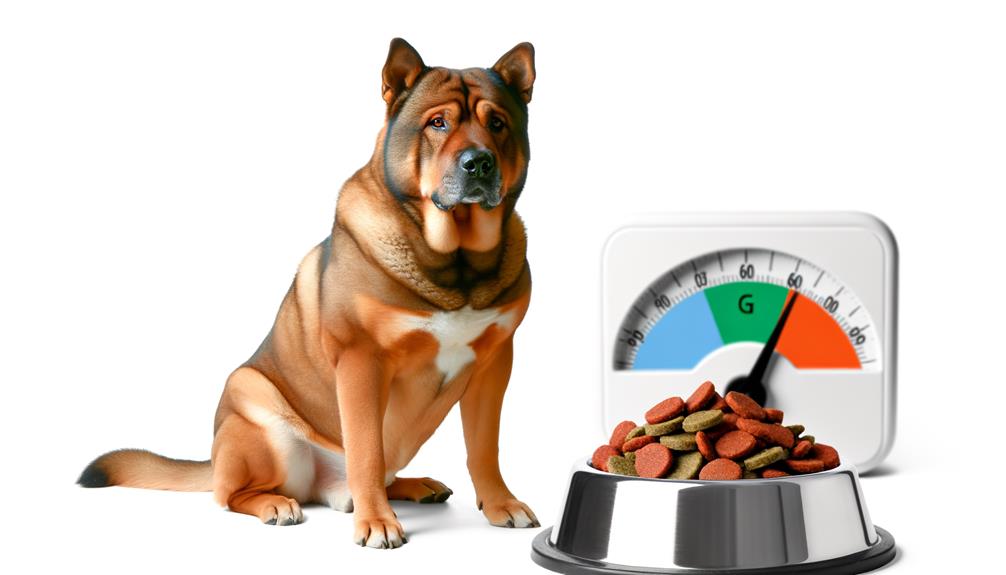
Now, let's move on to our review of Blue Buffalo Wilderness.
You're probably curious about its ingredients and how effective it is for weight gain.
Don't worry, we'll break it down for you.
Blue Buffalo Ingredients Analysis
Diving into the Blue Buffalo Wilderness formula, you'll find a wealth of high-quality ingredients designed to support healthy weight gain in your dog. Despite the Blue Buffalo controversy, it's clear the brand prioritizes quality. Protein-rich ingredients like deboned chicken, chicken meal, and fish meal top the list, providing the fuel your dog needs to pack on healthy pounds. Carb sources like peas and sweet potatoes contribute to balanced energy levels, while omega fatty acids from fish oil help maintain a shiny coat and healthy skin.
Concerning ingredient sourcing, Blue Buffalo states they use only natural ingredients enhanced with vitamins and minerals. However, it's important to note that some ingredients could be sourced internationally. Always research thoroughly to ensure your dog's food meets your standards.
Weight Gain Effectiveness
After feeding your dog Blue Buffalo Wilderness for a period of time, you may start to notice a healthy increase in their weight. This food can boost canine metabolism, which is crucial for weight gain. The high protein content helps build muscle, while the balanced fats provide energy and promote healthy skin and coat.
The grain-free formula also reduces the risk of dietary allergies that can hinder weight gain. However, remember that every dog is unique. Factors like breed, age, and health status can affect weight gain results. You'll need to monitor your dog's progress and adjust portion sizes as necessary.
Patience is key. It might take some time to see significant changes, but stick with it and you'll likely see positive results.
Review: Earthborn Holistic Great Plains
Let's take a closer look at Earthborn Holistic Great Plains, a high-quality dog food designed to promote weight gain. This product stands out in the grain-free debate by offering a balance between nutrition and taste. They've removed grains from their recipe, instead focusing on high-protein ingredients that contribute to weight gain and muscle development.
The holistic approach benefits of Earthborn Holistic Great Plains are manifold. They concentrate on providing a well-rounded diet for your pet, focusing on the whole animal rather than just addressing weight gain. Their recipes include bison and lamb meal as primary protein sources, supplemented by fruits and vegetables for added vitamins and minerals. This holistic approach ensures your dog isn't just gaining weight, but doing so in a healthy manner.
Flaxseed is also included in the recipe, which is known for its omega-3 fatty acids contributing to a shiny coat and healthy skin. Earthborn also includes L-carnitine in their formula, an amino acid that aids in the conversion of fat to muscle and energy, supporting your dog's weight gain and overall vitality.
In terms of taste, the consensus among dog owners is positive. Dogs seem to love the flavor, making meal times a joy.
Review: Purina Pro Plan Sport
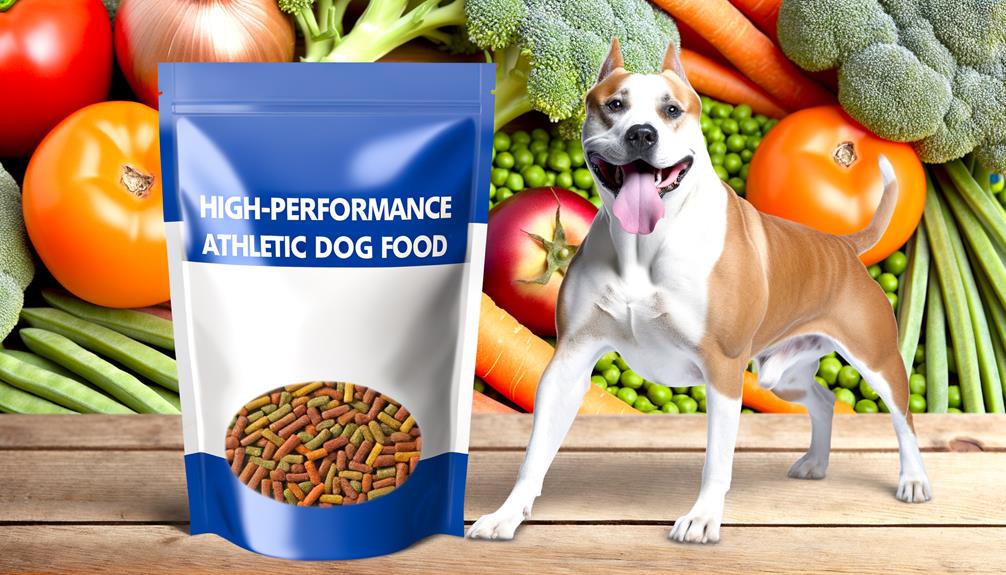
Transitioning to the Purina Pro Plan Sport, you'll find it's another excellent choice for promoting healthy weight gain in your dog. This brand is renowned for its Sport Performance Analysis, a detailed study of the nutritional needs of active dogs. The formula is designed to fuel metabolic needs and maintain lean muscle.
A quick look at the ingredients list reveals that the Pro Plan Sport series is packed with high-quality proteins like chicken, fish, or beef, depending on the variant you choose. These proteins are essential for building and maintaining muscle mass, which can contribute positively to your dog's weight gain.
The Dietary Adjustments Impact is also significant with this food. If your dog has been struggling to gain weight, switching to a diet that's rich in both protein and fat, like the Purina Pro Plan Sport, can make a substantial difference. Not only will your furry friend have a better chance of gaining weight, but they'll also benefit from increased energy levels.
Moreover, the food is fortified with essential vitamins and minerals that promote overall health. It's not just about helping your dog gain weight; it's about ensuring they're healthy, too. Remember, weight gain should be lean, not fatty.
Lastly, the Purina Pro Plan Sport series is highly palatable, so even the pickiest eaters will likely find it appetizing. This makes it easier for you to make the transition without worrying about your dog rejecting the new food.
Home-made Dog Food Options
If you're interested in taking a more hands-on approach to your dog's nutrition, preparing home-made meals can be an effective way to promote weight gain. This method allows you to control the ingredients and portions, ensuring your furry friend gets exactly what they need to bulk up healthily.
One popular option is a raw diet, which has numerous benefits. Raw foods are often higher in protein and nutrients than processed ones, which can lead to increased energy and lean muscle mass. They're typically less likely to contain fillers or unnecessary calories, too. This means your dog can eat more of what they need without the risk of unhealthy weight gain. Raw diets can include items like lean meats, certain fruits and vegetables, and eggs.
However, it's important to be aware of the hazards of feeding your dog human food. Not all human foods are safe for dogs, and some can even be toxic. Foods like chocolate, onions, garlic, and grapes should never be given to dogs. It's also crucial to avoid giving your dog too much fat or sugar, as these can lead to obesity and other health problems down the line.
Remember, every dog is unique, and what works well for one may not work for another. If you're considering a home-made diet, it's best to consult with your vet first. They can guide you in creating a balanced, nutritious menu that's safe and beneficial for your dog's specific needs.
In the end, the goal is to help your dog gain weight in a healthy, controlled manner. Home-made food is one way to achieve this, but it's not the only option. Keep exploring and stay tuned for our next subtopic: 'Nutritional Supplements for Weight Gain'.
Nutritional Supplements for Weight Gain
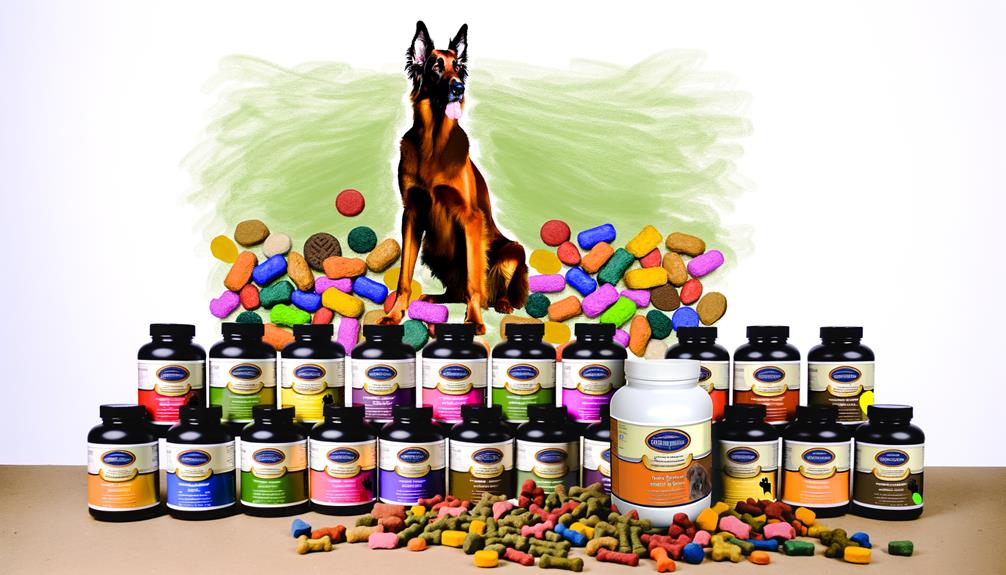
You might be wondering how to supplement your dog's diet for weight gain.
Let's talk about high-calorie supplement options and effective feeding techniques.
We'll guide you through selecting the right products and using them correctly to help your furry friend bulk up.
High-Calorie Supplement Options
Numerous high-calorie supplements are available that can assist in your dog's weight gain journey. It's crucial, however, to consider supplement safety and the use of alternative feeding methods. Some supplements come in the form of powder, to be mixed with your dog's regular food, while others are liquids or gels that can be fed directly. They're often packed with protein, fat, and essential vitamins to promote healthy weight gain.
But be cautious, not all high-calorie supplements are created equal. Always consult your vet before starting any new supplement regimen. They'll be able to recommend safe, effective options based on your dog's specific nutritional needs. Remember, the goal is healthy weight gain, not just any weight gain.
Effective Supplement Feeding Techniques
Now that we've covered what to look for in high-calorie supplements, let's discuss how to effectively incorporate them into your dog's diet for healthy weight gain. Supplement safety is paramount. Always consult your vet before starting any supplement regimen. They'll assess your pup's overall health and help with dosage determination, ensuring you're not over or under supplementing. Consider your dog's size, age, and current weight.
Start with a small dosage and gradually increase it, monitoring your dog's reaction. If you notice any adverse effects, dial back the dosage or stop altogether. Mix the supplement into their regular food to ensure they're ingesting it. Remember, consistency is key when it comes to supplement feeding techniques. With patience and careful monitoring, your fur-baby should start gaining weight healthily.
Scheduling Regular Vet Check-ups
Regular vet check-ups play a crucial role in monitoring your dog's weight gain progress. The right communication with your vet is vital to ensure that your dog's weight gain plan is working effectively. You should discuss your concerns, observations, and any changes in your pet's behavior with your vet. This open channel of vet communication helps in diagnosing any underlying health issues that might be contributing to your dog's weight problem.
Preventive care is another essential aspect of these check-ups. Your vet can counsel you on proper nutrition, exercise, and other preventive measures to help your dog gain weight safely. They can also advise on the need for any specific dietary supplements or changes in food portions. This guidance is crucial because overfeeding or unsupervised supplement intake can lead to obesity and other health problems.
Scheduling regular vet check-ups shouldn't be a daunting task. Mark your calendar for every three to six months, depending on your dog's age and health. Make sure you stick to these appointments, as they're an essential part of the weight gain process. If your dog is struggling to gain weight despite a well-balanced diet and exercise, your vet may need to run additional tests to rule out any medical conditions.
Monitoring Your Dog's Weight
Keeping a close eye on your dog's weight is vital as it provides valuable insight into your pet's overall health and dietary needs. Consistent monitoring allows you to detect weight fluctuations, which can be an early indicator of health issues. It's not merely about ensuring your dog gains weight, but about maintaining a healthy weight range.
Weight fluctuations can signify several concerns. If your dog is losing weight despite a high-calorie diet, it might be due to underlying health problems. On the other hand, excessive weight gain, even with the intention to help your dog gain weight, can lead to obesity risks. Obesity in dogs can result in numerous health problems, such as heart disease, diabetes, and arthritis. Hence, it's crucial to strike a balance when aiming for weight gain.
Regular weigh-ins should be part of your dog's routine. Investing in a pet scale can be beneficial for this purpose. Don't rely on visual cues alone; what might appear as a healthy weight might actually be overweight or underweight, depending on the breed.
Exercise and Weight Gain
Despite the focus on diet, incorporating regular exercise into your dog's routine is equally critical for healthy weight gain. You might be thinking, 'Weightlifting for dogs? Surely that's a joke!' But, in fact, it's not. Weightlifting for dogs doesn't mean your pup will be bench pressing barbells, but rather engaging in resistance training. This can be as simple as using weighted vests during walks or playing fetch uphill.
Physical activity not only burns calories but also builds muscle mass, which is heavier than fat. As your dog develops more muscle, they'll weigh more, and look and feel healthier. Remember, the aim is a gradual increase in weight through muscle gain, not a sudden pile-on of fat, which can lead to canine obesity risks.
So, what does this mean for your dog's exercise routine? It means you should mix it up, combining low-impact activities like walking or swimming, with resistance training to promote muscle development. Always make sure you're keeping your dog's breed, age, and current health in mind when designing an exercise routine. Some breeds may be more prone to certain health issues that could be exacerbated by intense exercise.
Incorporating regular exercise won't only aid in your dog's weight gain but also promote overall well-being, reducing the risk of obesity and associated health problems. Your dog's health is a balancing act between diet and exercise, and it's important to strike the right balance. With a proper diet and a good exercise regime, your dog can gain weight in a healthy and sustainable way.
Now, let's move on to the next subtopic, 'Review: Nutro Ultra Adult'.
Review: Nutro Ultra Adult
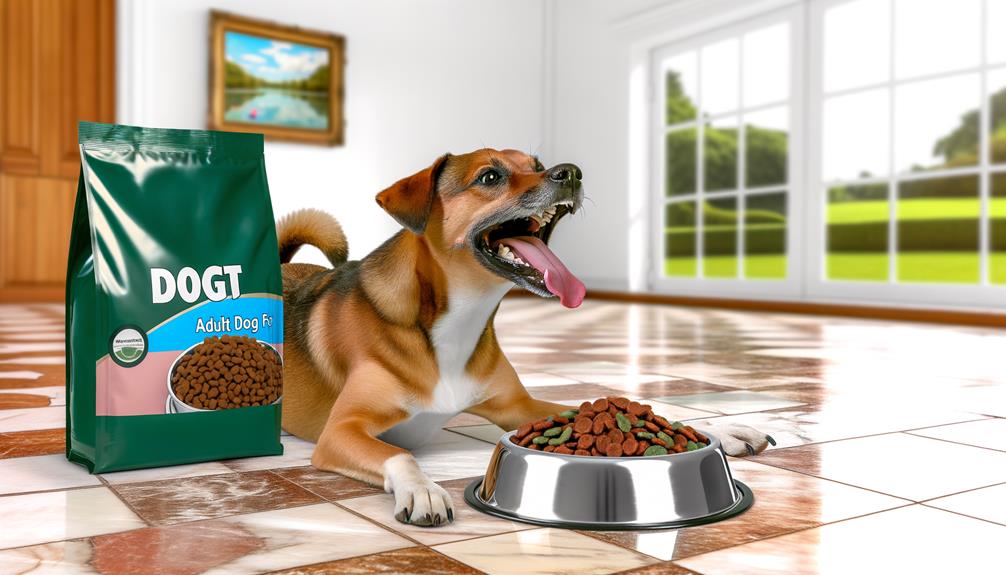
Shifting gears from exercise to nutrition, let's take a look at Nutro Ultra Adult, a dog food product that's been recommended for promoting healthy weight gain in dogs. This isn't just any ordinary dog food. Nutro Ultra Adult uses premium ingredients to ensure your pet receives the nutrition it needs.
Nutro Ultra benefits extend beyond just weight gain. This formula includes lean proteins like chicken, lamb, and salmon to help promote muscle development in your dog. The blend of 15 vibrant superfoods like chia, kale, and blueberries provides antioxidants that can support your dog's immune system. It's free of artificial colors, flavors, and preservatives, so you're only feeding your dog what it needs.
But how does Nutro Ultra Adult measure up in terms of cost? Well, it's a premium product, so it does come with a higher price tag compared to some other brands. However, the cost analysis reveals that it's worth every penny. The quality ingredients, the comprehensive nutrition provided, and the potential health benefits for your dog make it a worthy investment.
Consider this: if your dog's health improves and they gain weight steadily with Nutro Ultra Adult, you may save money on vet bills in the long run. Plus, a healthier and happier dog is priceless, right?
Overcoming Common Feeding Challenges
Even with the best dog food like Nutro Ultra Adult, you might still encounter some feeding challenges that can hinder your pet's weight gain. Food allergies impact your pet's ability to process certain ingredients, causing discomfort and potentially undermining their appetite. If you notice signs of an allergic reaction such as itching, diarrhea, or vomiting after meal times, it's essential to consult with a vet. They'll help identify the allergens and guide you towards suitable alternatives.
But what if your dog is just a picky eater? Picky eater solutions range from changing the feeding routine to trying out different food types and flavors. Sometimes, mixing wet and dry food can provide a texture that your dog might find more appealing. Remember, patience is key. It might take a while for your pet to get used to a new food or feeding routine.
It's also worth noting that psychological factors can impact feeding. Stress and anxiety can suppress your dog's appetite. If you've recently moved, brought home a new pet, or if there have been significant changes in the household, these could be causing your dog's lack of interest in food.
In such cases, maintaining a calm and predictable environment can do wonders to soothe your pet's anxiety. Regular exercise also stimulates appetite, so make sure your dog gets plenty of playtime and walks.
Overcoming these feeding challenges can be a hurdle but with patience, persistence, and a little professional guidance, you can ensure your furry friend is on the right track to healthy weight gain.
Frequently Asked Questions
Can Certain Breeds of Dogs Be More Susceptible to Weight Issues?
Yes, certain breeds can be more susceptible to weight issues due to genetic predisposition. Breed specific nutrition is crucial because what's suitable for one breed might not be beneficial for another.
Are There Any Specific Exercises Recommended for Underweight Dogs?
Yes, there are. You should monitor your dog's activity and gradually increase exercise intensity. Low-impact exercises like swimming or short walks can be beneficial for underweight dogs to gain muscle without straining themselves.
How Does Neutering or Spaying Impact a Dogs Weight?
Neutering or spaying can cause hormonal changes in your dog, often leading to weight gain. You'll need to monitor their post-surgery care closely, adjusting exercise and diet to maintain a healthy weight.
Can Overfeeding Lead to Other Health Problems Apart From Weight Gain?
Yes, overfeeding can cause other health problems beyond weight gain. It can disrupt feeding frequency and require dietary adjustments due to issues like diabetes, heart disease, and joint problems. Always feed your pet responsibly.
What Are the Signs of a Food Allergy in Dogs?
If your dog's showing signs like skin irritations or allergy-induced behavior changes, they may have a food allergy. Excessive scratching, biting, or licking can indicate skin issues. Behavior changes might include restlessness or lethargy.
Conclusion
In conclusion, you've got plenty of high-calorie dog food options to help your furry friend put on a few healthy pounds. Remember, it's crucial to pair this with regular exercise and monitor their weight regularly.
Nutro Ultra Adult is a great choice, but always consult with your vet to tailor the diet to your dog's specific needs.
Overcoming feeding challenges may take time, but it's all worth it for your dog's wellbeing.

